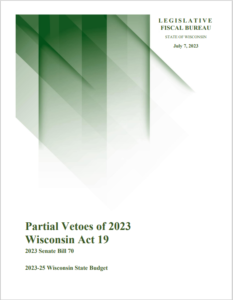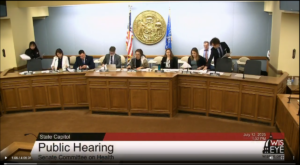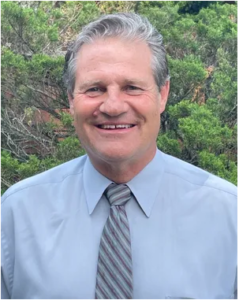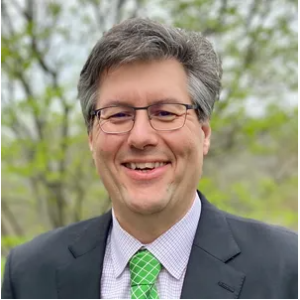
In this update:
- Budget Updates
- Legislative Updates
- Election Updates
- Fundraising Opportunities
Budget Updates
Vos says GOP considering lawsuit over Evers’ partial veto
Assembly Speaker Robin Vos (R) said on WISN’s “UpFront” this week that Republican legislators were considering filing a lawsuit over Gov. Tony Evers’ (D) partial veto that resulted in a 402-year increase in per-pupil funding for the state’s K-12 public schools. The original budget passed by the Legislature allowed school districts to raise revenue limits by $325 over the next two years. Gov. Evers struck the dash and “20” from the original budget language, resulting in a $325 increase annually until the year 2425, roughly 402 years from now.
Speaker Vos claimed the governor’s partial veto violated the spirit of their closed-door negotiations and proved the governor is a “liar”. “He lied to the people of Wisconsin in the campaign last year,” Speaker Vos said. “He lied to us during the negotiation process, and now it really calls into question his ability to try to find bipartisan compromises like we’ve been working on this entire year.” Speaker Vos said it was unlikely that any Assembly Democrats would vote to override the governor’s partial vetoes, so filing a lawsuit was the only action Republicans could take to challenge the veto. Calling Gov. Evers’ partial veto “unprecedented,” Speaker Vos also said that Republicans were considering proposing a constitutional amendment that would further restrict the partial veto powers of the state’s governor.
In a separate interview with WKOW’s “Capitol Sunday,” Gov. Evers called Speaker Vos’ allegations of dishonesty “childish” and denied that he lied to GOP legislative leaders during budget negotiations. “We never ever talked about what the school funding would look like after these next two years,” Gov. Evers said. “We talked about it in terms of what is going to happen the next two years, but nothing beyond that. We never talked about that. He knows that. I know that. Senator LeMahieu knows that. So no, I disagree with his assessment. It’s easy to say. But he cannot prove that.”
Creative partial vetoes have a long history in Wisconsin. In 2017, then-Governor Scott Walker (R) used a partial veto — dubbed the “thousand-year veto” — to extend the deadline for a state program from 2018 to 3018. Going back further, in the late 1980’s, then-Governor Tommy Thompson (R) used the partial veto on letters and word fragments in a way that created completely new words, sentences, and dollar amounts, a practice that was known as the “Vanna White” veto. Wisconsin voters eventually adopted constitutional amendments in 1990 and 2008 to limit some of the governor’s partial veto authority, including by prohibiting the “Vanna White” veto.
LFB projects state will end biennium with $4 billion surplus
 The nonpartisan Legislative Fiscal Bureau released a memo detailing the fiscal effects of Gov. Tony Evers’ (D) partial vetoes to the state budget. LFB now projects Wisconsin will finish the 2023-25 biennium with a more than $4 billion surplus largely due to the governor’s partial veto of GOP-backed income tax cuts. The partial veto means the state will collect $2.7 billion in additional revenue over the next two years that would have otherwise gone to the income tax cuts passed by the Legislature in the FY 2023-25 biennial budget. According to LFB, the additional revenue will produce increased interest earnings of $51.3 million in 2023-24 and $98.5 million in 2024-25. Gov. Evers also vetoed a provision that would have required the Department of Revenue to update withholding tables to reflect the reduced income tax rates associated with the tax cuts which also resulted in an additional $603.4 million in increased revenue.
The nonpartisan Legislative Fiscal Bureau released a memo detailing the fiscal effects of Gov. Tony Evers’ (D) partial vetoes to the state budget. LFB now projects Wisconsin will finish the 2023-25 biennium with a more than $4 billion surplus largely due to the governor’s partial veto of GOP-backed income tax cuts. The partial veto means the state will collect $2.7 billion in additional revenue over the next two years that would have otherwise gone to the income tax cuts passed by the Legislature in the FY 2023-25 biennial budget. According to LFB, the additional revenue will produce increased interest earnings of $51.3 million in 2023-24 and $98.5 million in 2024-25. Gov. Evers also vetoed a provision that would have required the Department of Revenue to update withholding tables to reflect the reduced income tax rates associated with the tax cuts which also resulted in an additional $603.4 million in increased revenue.
Senate co-chair Howard Marklein (R) called the LFB memo “a painful reminder of what we could have done, what should be done, with the Republican tax cut.” JFC Assembly co-chair Mark Born (R) said a bill to cut taxes would likely be re-introduced yet this session by Republicans “because we know the people of this state know how to spend their money better than the government does.” Gov. Evers said on WISC-TV’s “For the Record” that he was open to negotiating with Republicans to cut taxes for the middle class, but he would veto any bill that includes the same tax cuts that he partially vetoed in the budget bill.
Legislative Updates
Bipartisan group of lawmakers advocate for expanded coverage of breast cancer screenings
 The Senate Health Committee held a public hearing Wednesday on SB 121, a bill that would require health insurers to cover — at no cost to the patient — supplemental or diagnostic breast cancer screenings for those women with dense breast tissue or an increased risk of breast cancer. Current state law requires health insurers to pay for one mammogram annually for women 50 and older, or two mammograms for women ages 45 to 49 who meet certain criteria. According to the Centers for Disease Control and Prevention (CDC), a typical mammogram may not be enough to detect a tumor on the roughly 40% of women who have dense breast tissue. That’s because telling the difference between a tumor and dense breast tissue on a mammogram is akin to spotting “a polar bear in a snowstorm,” according to Dr. Anand Narayan, a radiologist and breast imaging specialist, who testified at the hearing.
The Senate Health Committee held a public hearing Wednesday on SB 121, a bill that would require health insurers to cover — at no cost to the patient — supplemental or diagnostic breast cancer screenings for those women with dense breast tissue or an increased risk of breast cancer. Current state law requires health insurers to pay for one mammogram annually for women 50 and older, or two mammograms for women ages 45 to 49 who meet certain criteria. According to the Centers for Disease Control and Prevention (CDC), a typical mammogram may not be enough to detect a tumor on the roughly 40% of women who have dense breast tissue. That’s because telling the difference between a tumor and dense breast tissue on a mammogram is akin to spotting “a polar bear in a snowstorm,” according to Dr. Anand Narayan, a radiologist and breast imaging specialist, who testified at the hearing.
Introduced by Senate Health Committee Chair Rachael Cabral-Guevara (R), SB 121 has already been co-sponsored by over one-third of the Legislature and received bipartisan praise during Wednesday’s public hearing. “Under no circumstances should cancer be allowed to spread undetected … after getting a screening such as a mammogram,” Sen. Cabral-Guevara said. Sen. Tim Carpenter (D) agreed the bill is essential for protecting women from breast cancer and pushed back against claims from health insurers that requiring additional mammograms without co-pays would raise costs for everyone. According to testimony by Dr. Narayan and documents from the Maryland Health Care Commission, a similar law in that state led to a $0.07 per member per month premium increase. Citing the Wisconsin law passed in 2007 that began requiring health insurers to cover annual mammograms for women age 50 and older, Sen. Carpenter said, “Since we’ve been through this, you know, down this road before, about simply requiring insurance companies to pay for [a] mammography, now what we’re doing is having them take it a step further because we know more with technology and more women [are] finding out about dense breast tissue. My sister had it, and she had no idea.”
Should the bill be passed by the Senate Health Committee, it would then go to the full Senate for approval, after which it would be sent to the Assembly.
Election Updates
Special Election for 24th Assembly District on July 18


The special election for the 24th Assembly District will be held this upcoming Tuesday, July 18. Republican Paul Melotik, an Ozaukee County supervisor, and Democrat Bob Tatterson, a retired engineer, will face-off to fill the seat vacated by Sen. Dan Knodl (R), who was elected to the 8th Senate District following the retirement of longtime State Senator Alberta Darling (R). The 24th AD is located in southeastern Wisconsin and comprises parts of southern Ozaukee County, southeast Washington County, and northeast Waukesha County. An analysis of the state’s legislative maps rates the 24th Assembly District as a “safe Republican” district. Mr. Tatterson previously ran for the seat and lost to then-Rep. Knodl in November 2022. Rep. Knodl received 64% of the vote while Mr. Tatterson received 35%.
The Assembly currently has 63 Republicans and 35 Democrats. Even if Mr. Melotik wins the election Tuesday, Republicans will still be two seats shy of a supermajority in the Assembly.
Democrats preparing to challenge Van Orden
 The race to challenge U.S. Rep. Derrick Van Orden (R) in 2024 for Wisconsin’s 3rd Congressional District seat began to take shape this week with small business owner Rebecca Cooke (D) officially launching her campaign bid and 71st AD State Rep. Katrina Shankland (D) telling the Milwaukee Journal Sentinel that she is “exploring” a bid as well. Other Democrats who are reportedly considering a challenge to Rep. Van Orden include Wisconsin Economic Development Corp CEO Missy Hughes and Tara Johnson, the former chair of the La Crosse County Board.
The race to challenge U.S. Rep. Derrick Van Orden (R) in 2024 for Wisconsin’s 3rd Congressional District seat began to take shape this week with small business owner Rebecca Cooke (D) officially launching her campaign bid and 71st AD State Rep. Katrina Shankland (D) telling the Milwaukee Journal Sentinel that she is “exploring” a bid as well. Other Democrats who are reportedly considering a challenge to Rep. Van Orden include Wisconsin Economic Development Corp CEO Missy Hughes and Tara Johnson, the former chair of the La Crosse County Board.
Ms. Cooke previously ran for the 3rd CD in 2022 and came in second place in a four-way Democratic primary. She took 31.1% of the overall vote compared to the eventual Democratic-nominee and current State Sen. Brad Pfaff’s 38.9%. In her most recent campaign announcement, Ms. Cooke said she’s running for Congress because “Families are struggling to get by and deserve a champion who knows what it’s like to make ends meet and actually shows up for neighbors in need.”
In response to the potential slate of Democratic contenders, Republican Party of Wisconsin spokesperson Rachel Reisner praised Rep. Van Orden’s record in Congress, calling him a “champion for western Wisconsin, working tirelessly to ensure Wisconsin families, veterans and farmers have an effective voice in Congress.” Rep. Van Orden defeated State Sen. Brad Pfaff 51.8% to 48.1% in the 2022 general election.



